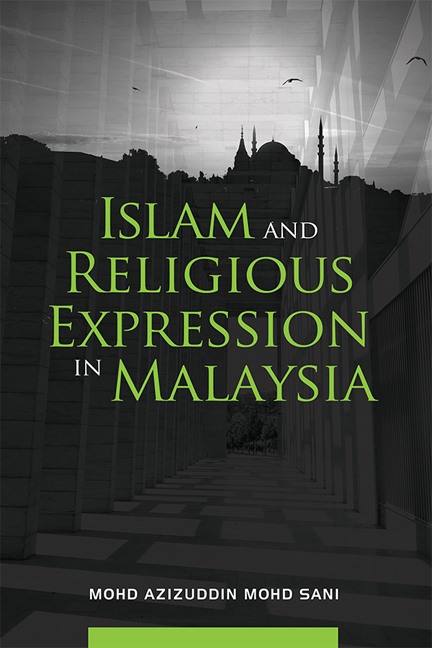Book contents
- Frontmatter
- Cantents
- Foreword
- Preface
- Acknowledgements
- List of Acronyms and Abbreviations
- 1 Freedom of Expression
- 2 Islamization Policy and Islamic Bureaucracy
- 3 Inter-Religious Expression
- 4 Intra-Religious Expression
- 5 Extreme Expression and Radicalization
- 6 New Malaysia under Pakatan Harapan
- 7 Conclusion: Seeking for a Genuine Freedom of Religious Expression
- Bibliography
- Index
- About the Author
3 - Inter-Religious Expression
Published online by Cambridge University Press: 10 November 2020
- Frontmatter
- Cantents
- Foreword
- Preface
- Acknowledgements
- List of Acronyms and Abbreviations
- 1 Freedom of Expression
- 2 Islamization Policy and Islamic Bureaucracy
- 3 Inter-Religious Expression
- 4 Intra-Religious Expression
- 5 Extreme Expression and Radicalization
- 6 New Malaysia under Pakatan Harapan
- 7 Conclusion: Seeking for a Genuine Freedom of Religious Expression
- Bibliography
- Index
- About the Author
Summary
Introduction
Freedom of expression is a fundamental liberty that all modern states should have in their constitutions and implement in the society. But freedom of expression is not absolute even to the defenders of the right. There is a heated debate in identifying the kinds of expressions that warrant constitutional protection. It is rather ironic that some staunch defenders of free expression deny certain other practices including religious expression. Gregory P. Magarian (2010) explains that there are arguments for normative constraints on religious argument and the translation imperative on the ground that religious arguments threaten liberal democracy. They posit two distinctive sorts of danger. First, they contend that religious beliefs cannot provide adequate justifications for coercive governmental actions in conditions of democratic pluralism. Members of a liberal democratic political community should not offer religious arguments in public debate because such arguments by definition urge improper grounds for government action. Any coercion based on religious arguments is unfair to non-believers, because such coercion denies non-believers equal respect and full and fair access to the process of political decision-making (Audi 1989, pp. 259–76; Greene 1993, pp. 1611–33). Second, religious arguments undermine public political debate, and thus threaten liberal democracy, by fostering social and political instability. Religious arguments, on the restrictive theorists’ account, carry a distinctive capacity to inspire intolerance of opposing political viewpoints (Audi 1997, p. 5; Rorty 1994, pp. 1–6; Marshall 1993, pp. 843–58; Sullivan 1992, pp. 195–99).
In contrast, some theorists argue that secularism poses a greater threat to liberal democracy than religion. Some compare what they portray as overblown claims of religion's divisiveness to the genuine divisiveness of political advocacy by or for historically disadvantaged racial and ethnic groups (McConnell 1999, pp. 639–48). First, they reject the restrictive concern that leads to religious arguments in public political debate denying non-believers equal respect and regard by underwriting religious justifications for coercive government actions. These theorists maintain that whatever features of insularity or exceptionalism might cause certain religious arguments to alienate non-believers and are equally likely to cause certain secular arguments to alienate believers or others. In any event, they contend that religious arguments in public political debate do not dictate policy outcomes but simply make “one contribution among others in a debate about how political power is to be used” (Alexander 1993, pp. 775–76; Waldron 1993, pp. 817–29).
- Type
- Chapter
- Information
- Islam and Religious Expression in Malaysia , pp. 65 - 80Publisher: ISEAS–Yusof Ishak InstitutePrint publication year: 2020

